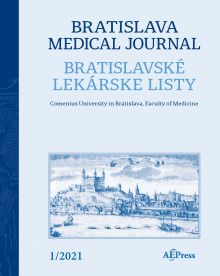Journal info
|
||||
Select Journal
Journals
Bratislava Medical Journal 2024 2023 2022 2021 2020 2019 2018 2017 2016 2015 2014 2013 2012 Ekologia - Ecology Endocrine Regulations General Physiology and Biophysics Neoplasma Acta Virologica Studia Psychologica Cardiology Letters Psychológia a patopsych. dieťaťa Kovove Materialy-Metallic Materials Slovenská hudba 2025Webshop Cart
Your Cart is currently empty.
Info: Your browser does not accept cookies. To put products into your cart and purchase them you need to enable cookies.
Bratislava Medical Journal Vol.125, No.12, p 823–828, 2024 |
||
| Title: Peculiarities of nutritional support in patients with neoplasms of the hepatopancreatoduodenal zone as a component of intensive therapy in the postoperative period | ||
| Author: Sherzad Kurbanalievich DAVANOV, Natalia Nikolaevna VASILYEVA, Svetlana Vladimirovna PLYASSOVSKAYA, Xenia Eduardovna MKHITARYAN, Gulmira Alievna ZHANALINA, Svetlana Ivanovna ROGOVA, Vladimir Nikolaevich PRIZ, Gulnur Zhanibekovna TOKTIBAYEVA, Dinara Serikovna AUBAKIROVA | ||
| Abstract: BACKGROUND: A pressing concern involves the efficient and intensive treatment of complications arising from malignant tumors in the hepatopancreatoduodenal region. This matter is closely tied to rectifying energy deficits, addressing insufficient body weight, and restoring proper metabolic processes. This is particularly crucial post-surgery, as the process is hindered by significant hypercatabolism, heightened nutritional requirements, and the presence of intoxication syndrome. OBJECTIVE: To consider the features of nutritional support in patients with tumors of the hepatopancreatoduodenal zone in the early postoperative period. METHODS: An investigation was carried out on 91 individuals aged 18 years and older who were afflicted with malignant tumors situated in the hepatopancreatoduodenal area. These patients were categorized into three distinct groups, each receiving a different form of nutritional assistance. The assessment encompassed various aspects of the patients’ nutritional well-being, including outcomes from the screening protocol, body mass index, basal metabolic rate, and critical laboratory measurements such as blood lymphocyte count, total protein level, total bilirubin concentration, as well as ALaT and ASaT levels. RESULTS: Under the provision of parenteral nutritional support, as per the applied screening protocols, a span of 10 to 12 days saw 17 patients sustaining a “normal” nutritional state, while 14 patients experienced a condition of “moderate malnutrition.” Notably, one patient (3.2%) demonstrated a regression from the status of “severe malnutrition.” In the mixed nutrition group, within the same 10 to 12-day timeframe post-operation, there was a rise in the prevalence of patients classified as having “moderate malnutrition” according to the SGA and NRI scales by 10% and 6.7%, respectively. Remarkably, all indicators pointing to “severe malnutrition” were entirely eliminated as assessed by the mentioned nutritional evaluation scales (p<0.005). CONCLUSION: A notable degree of effectiveness in stabilizing and upholding the nutritional condition of patients was attainable within the isolated parenteral nutrition group. This achievement was realized by elevating the count of patients classified under “moderate” and “normal” nutritional statuses, and concurrently diminishing the number of patients experiencing severe and moderate nutritional insufficiency, respectively. The mixed type of nutritional support in this case can be considered with a high degree of probability as an alternative replacement for parenteral nutrition, due to the statically similar indicators of the nutritional status of patients achieved in this study (Fig. 4, Ref. 12). |
||
| Keywords: nutritional status, nutritional deficiency, nutritional support, sips, oncology, nutrition, tumors of the hepatopancreatobiliary zone | ||
| Year: 2024, Volume: 125, Issue: 12 | Page From: 823, Page To: 828 | |
| doi:10.4149/BLL_2024_126 |
||
|
|
 download file download file |
|

